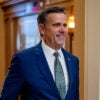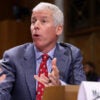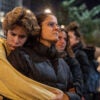It’s not that Bill O’Reilly was pecksniffian in his verbal sparring with Bill Maher last week on the topic of religion. The powerhouse host of Fox News was just plain ill-equipped.
A good-natured O’Reilly failed to put up an effective defense as an unhappy-looking Maher unpacked his usual smug ridicule of anyone who believes in God – especially those imbecilic Christians – in a segment aired over two nights on “The O’Reilly Factor.”
Bill, Bill, Bill: Many viewers were a little discouraged when the best you could do, having bloviated on the “allegorical” teaching of the Bible, was to say “Jesus seemed to be a pretty good guy” and ask Maher what’s so wrong with loving one another.
Hope springs eternal, though. O’Reilly – and the folks as well – can find plenty of edifying evidence to counter the Mahers of this world in a new book, “In Defense of Faith: The Judeo-Christian Idea and the Struggle for Humanity” (Encounter).
The author is David Brog, a self-described “largely secular” Jew and former U.S. Senate aide who now runs the Texas-based group Christians United for Israel. Brog stopped by Heritage last Friday to give a talk rebutting the popular accusation that people who believe in God are responsible for everything bad. (Mr. O’Reilly and others can watch here.)
Forty years ago, John Lennon naively sang that “the world will live as one” if among other things there were “no religion too.”
Today, Brog told his audience, he fears the West is “losing the battle for preservation of the Judeo-Christian tradition.”
Anti-Christian bigotry – especially anti-evangelical and anti-Catholic – is the last acceptable prejudice. Americans appear to be abandoning their Christian faith in the highest numbers ever recorded, according to a recent Pew Research Center study.
In his 365-page book, Brog concentrates on building a case that – say what you will about the Middle Ages – the Judeo-Christian tradition over the past several hundred years rolled up a stellar, even “miraculous” record of instilling compassion and respect for individual dignity in Western civilization.
“The Judeo-Christian idea,” Brog argues, inspires man to transcend a natural focus on self, family and “in group” and compels him to risk life and livelihood for members of an “out group” – whether they live across the tracks or across the seas.
In the years before Jesus’ ministry, as O’Reilly might have informed Maher, neither the ancient Greeks nor Romans taught generosity and compassion toward outsiders. They not only enslaved outsiders, they killed their own newborn babies for being female or otherwise undesirable.
And after Jesus was crucified, it wasn’t the great Enlightenment thinkers who taught love of outsiders. Rather, they essentially “invented the concept of racism,” Brog argues, tainting even such an expansive mind as Thomas Jefferson’s.
“The Judeo-Christian tradition was alone in recognizing equality and preaching love,” Brog said. “Critics think they’ve reasoned their way to these insights, but they come from the Bible. … We tend to be born on a moral third base, and think we hit a triple.”
Who’s on third, Bill Maher?
Brog, who spoke at Heritage as a guest of our DeVos Center for Religion and Civil Society, contended it’s no accident that Christians led most of history’s human rights campaigns. Among them: movements to end the slaughter and abuse of the “Indians” in Central, South and North America; to abolish the slave trade and the institution of slavery in the United States; to guarantee civil rights to black Americans and other racial and ethnic minorities; and to fight hunger, disease and even debt in the Third World.
If O’Reilly had read or heard Brog, he could have reminded Maher that one of the great 20th-century Americans, the Rev. Martin Luther King Jr., was an ordained Baptist minister. He was entrusted with a church in Montgomery, Ala., where he became a leader of the famed 1956 boycott of segregated buses.
Christopher Hitchens and other professional atheists strain to diminish King’s Christian faith and calling. One of Brog’s most moving uses of the historic record is King’s own account, after hateful men bombed his home in January 1956, of hearing the “voice of Jesus” promise not to leave him alone. King was afraid, he wrote in “Stride Toward Freedom,” but gained the strength to face anything.
Addressing an angry crowd of friends and followers outside the house, King urged them not to panic or become violent but rather to “love our enemies” as Jesus taught – and “let them know you love them.”
Faith does make a difference, O’Reilly could have pointed out. Just where does Maher think he got his professed altruism? Who does he think started and spread America’s hospitals, orphanages, widows’ funds, animal shelters?
Politically incorrect or not, Maher embraces more than a few virtues because of the Judeo-Christian tradition. American culture continues to draw on transcendent ideas injected and nurtured by generations of Christian and Jewish believers. We would be desperately the poorer without them.
It’s a safe bet that O’Reilly and Maher both can sing along to “Get Together,” a 1969 hit for the Youngbloods: “C’mon people now, smile on your brother / Everybody get together, try to love one another right now.”
So, O’Reilly: Don’t be a popinjay. Study up. Talk with David Brog – hey, read his book – before your next televised encounter with Maher or a like-minded mocker.


























